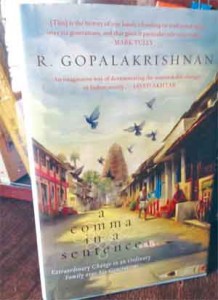 The back flap of the book states that this is Gopal’s “first book outside of the business genre.” True, Gopal has been prolific in the last eight years with business books such as – The Case of the Bonsai Manager, When the Penny Drops, What the CEO Really Wants You to Know – and executives aspiring to grow and contribute could ill afford to miss any of them.
The back flap of the book states that this is Gopal’s “first book outside of the business genre.” True, Gopal has been prolific in the last eight years with business books such as – The Case of the Bonsai Manager, When the Penny Drops, What the CEO Really Wants You to Know – and executives aspiring to grow and contribute could ill afford to miss any of them.
I submit that his new book – A Comma in a Sentence – Extraordinary Change in an Ordinary Family over Six Generations – may equally interest an executive as it would to an anthropologist. Interestingly, this could pass off nicely as a book on the history of India, especially south India, seen through an executive’s lens.
To the tens of thousands of Tambram (Tamil Brahmin) executives this could be their own story although not many would take the pains to dig into the history of more than two generations. They would happily join the author in ruing the decline of their immense influence in political, bureaucratic and business corridors in recent years. But their fundamental importance to hard work, discipline and sense of tradition is still keeping them ahead in a country that is today in a swirl of identity politics. To those who wonder about how Tambrams managed to be in high positions everywhere in India, this book offers an interesting view into their history, their struggles, their triumphs and delusions.
If not the first half, the second half of the book has a lot for executives to learn from the author’s rich and varied experience of close to five decades in Hindustan Lever and the Tatas. Gopal narrates incidents and the personalities of people he learnt from during his early days in HUL.
The author’s father Rajam’s character is central to the book. His story is riveting to say the least – a handicapped village boy who went on to become a CFO in a big company in a city two thousand miles away.
Anecdotes that show his bravery while rescuing his relative during the communal riots in Calcutta post independence and losing his plush job for egoistic reasons make the book come alive. Gopal’s narration of the effortless art of passing on the traditions from one generation, to the other, for five generations, until the present one where it looks like it has broken down, is fascinating.
Executives, like every parent today, have very little clue about parenting their adolescent and teenage kids. The generational divide is so huge that parents need parenting lessons more than today’s Gen X needing ‘growing up’ lessons. Gopal’s experience in how he stuck to the Sanskar (passing on traditions from one generation to the next) model with generous flexibility to raising his three kids is invaluable. Of course, Gopal’s trademark style of anecdotes, with a dash of humor, spice up the book quite nicely. Benedict Paramanand (benedict@managementnext.com)










Recent Comments